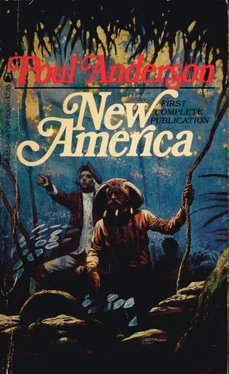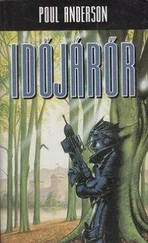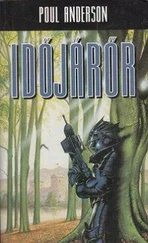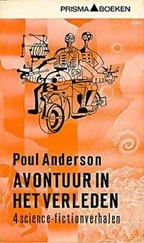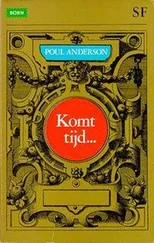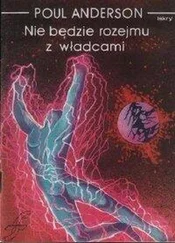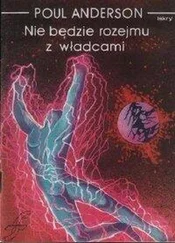“Dream,” she said, and for a space she struggled to rouse herself. But the effort was weak. Why should she believe ashen tales about… atoms and energies, nothing else to fill a gape of emptiness… tales she could not bring to mind… when Tim and the horse her father gave her carried her on to Jimmy? Had the other thing not been the evil dream, and this her first drowsy awakening from it?
As if he heard her thoughts, he murmured, “They have a song in Outling lands. The Song of the Men:
“The world sails to
an unseen wind.
Light swirls by the bows.
The wake is night.
But the Dwellers have no such sadness.”
“I don’t understand,” she said.
He nodded. “There’s much you’ll have to understand, darling, and I can’t see you again until you’ve learned those truths. But meanwhile you’ll be with our son.”
She tried to lift her head and kiss him. He held her down. “Not yet,” he said. “You’ve not been received among the Queen’s people. I shouldn’t have come for you, except that she was too merciful to forbid. Lie back, lie back.”
Time blew past. The horse galloped tireless, never stumbling, up the mountain. Once she glimpsed a troop riding down it and thought they were bound for a last weird battle in the west against… who?… one who lay cased in iron and sorrow—Later she would ask herself the name of him who had brought her into the land of the Old Truth.
Finally spires lifted splendid among the stars, which are small and magical and whose whisperings comfort us after we are dead. They rode into a courtyard where candles burned unwavering, fountains splashed and birds sang. The air bore fragrance of brok and pericoup, of rue and roses, for not everything that man brought was horrible. The Dwellers waited in beauty to welcome her. Beyond their stateliness, pooks cavorted through the gloaming; among the trees darted children; merriment caroled across music more solemn.
“We have come—” Tim’s voice was suddenly, inexplicably, a croak. Barbro was not sure how he dismounted, bearing her. She stood before him and saw him sway on his feet.
Fear caught her. “Are you well?” She seized both his hands. They felt cold and rough. Where had Sambo gone? Her eyes searched beneath the cowl. In this brighter illumination, she ought to have seen her man’s face clearly. But it was blurred, it kept changing. “What’s wrong, oh, what’s happened?”
He smiled. Was that the smile she had cherished? She couldn’t completely remember. “I, I must go,” he stammered, so low she could scarcely hear. “Our time is not ready.” He drew free of her grasp and leaned on a robed form which had appeared at his side. A haziness swirled over both fheir heads. “Don’t watch me go… back into the earth,” he pleaded. “That’s death for you. Till our time returns—There, our son!”
She had to fling her gaze around. Kneeling, she spread wide her arms. Jimmy struck her like a warm, solid cannonball. She rumpled his hair; she kissed the hollow of his neck; she laughed and wept and babbled foolishness; and this was no ghost, no memory that had stolen off when she wasn’t looking. Now and again, as she turned her attention to yet another hurt which might have come upon him—hunger, sickness, fear—and found none, she would glimpse their surroundings. The gardens were gone. It didn’t matter.
“I missed you so, Mother. Stay?”
“I’ll take you home, dearest.”
“Stay. Here’s fun. I’ll show. But you stay.”
A sighing went through the twilight. Barbro rose. Jimmy clung to her hand. They confronted the Queen.
Very tall she was in her robes woven of north-lights, and her starry crown and her garlands of kiss-me-never. Her countenance recalled Aphrodite of Milos, whose picture Barbro had often seen in the realms of men, save that the Queen’s was more fair and more majesty dwelt upon it and in the night-blue eyes. Around her the gardens woke to new reality, the court of the Dwellers and the heaven-climbing spires.
“Be welcome,” she spoke, her speaking a song, “forever.”
Against the awe of her, Barbro said, “Moon-mother, let us go home.”
“That may not be.”
“To our world, little and beloved,” Barbro dreamed she begged, “which we build for ourselves and cherish for our children.”
“To prison days, angry nights, works that crumble in the fingers, loves that turn to rot or stone or driftweed, loss, grief, and the only sure-ness that of the final nothingness. No. You too, Wanderfoot who is to be, will jubilate when the banners of the Outworld come flying into the last of the cities and man is made wholly alive. Now go with those who will teach you.”
The Queen of Air and Darkness lifted an arm in summons. It halted, and none came to answer.
For over the fountains and melodies lifted a gruesome growling. Fires leaped, thunders crashed. Her hosts scattered screaming before the steel thing which boomed up the mountainside. The pooks were gone in a whirl of frightened wings. The nicors flung their bodies against the unalive invader and were consumed, until their Mother cried to them to retreat.
Barbro cast Jimmy down and herself over him. Towers wavered and smoked away. The mountain stood bare under icy moons, save for rocks, crags, and farther off a glacier in whose depths the auroral light pulsed blue. A cave mouth darkened a cliff. Thither folk streamed, seeking refuge underground. Some were human of blood, some grotesques like the pooks and nicors and wraiths; but most were lean, scaly, long-tailed, long-beaked, not remotely men or Outlings.
For an instant, even as Jimmy wailed at her breast—perhaps as much because the enchantment had been wrecked as because he was afraid —Barbro pitied the Queen who stood alone in her nakedness. Then that one also had fled, and Barbro’s world shivered apart.
The guns fell silent; the vehicle whirred to a halt. From it sprang a boy who called wildly, “Shadow-of-a-Dream, where are you? It’s me, Mistherd, oh, come, come!”—before he remembered that the language they had been raised in was not man’s. He shouted in that until a girl crept out of a thicket where she had hidden. They stared at each other through dust, smoke, and moonglow. She ran to him.
A new voice barked from the car, “Barbro, hurry!”
Christmas Landing knew day; short at this time of year, but sunlight, blue skies, white clouds, glittering water, salt breezes in busy streets, and the sane disorder of Eric Sherrinford’s living room.
He crossed and uncrossed his legs where he sat, puffed on his pipe as if to make a veil, and said, “Are you certain you’re recovered? You mustn’t risk overstrain.”
“I’m fine,” Barbro Cullen replied, though her tone was flat. “Still tired, yes, and showing it, no doubt. One doesn’t go through such an experience and bounce back in a week. But I’m up and about. And to be frank, I must know what’s happened, what’s going on, before I can settle down to regain my full strength. Not a word of news anywhere.”
“Have you spoken to others about the matter?”
“No. I’ve simply told visitors I was too exhausted to talk. Not much of a lie. I assumed there’s a reason for censorship.”
Sherrinford looked relieved. “Good girl. It’s at my urging. You can imagine the sensation when this is made public. The authorities agreed they need time to study the facts, think and debate in a calm atmosphere, have a decent policy ready to offer voters who’re bound to become rather hysterical at first.” His mouth quirked slightly upward. “Furthermore, your nerves and Jimmy’s get their chance to heal before the journalistic storm breaks over you. How is he?”
“Quite well. He continues pestering me for leave to go play with his friends in the Wonderful Place. But at his age, he’ll recover—he’ll forget.”
Читать дальше
